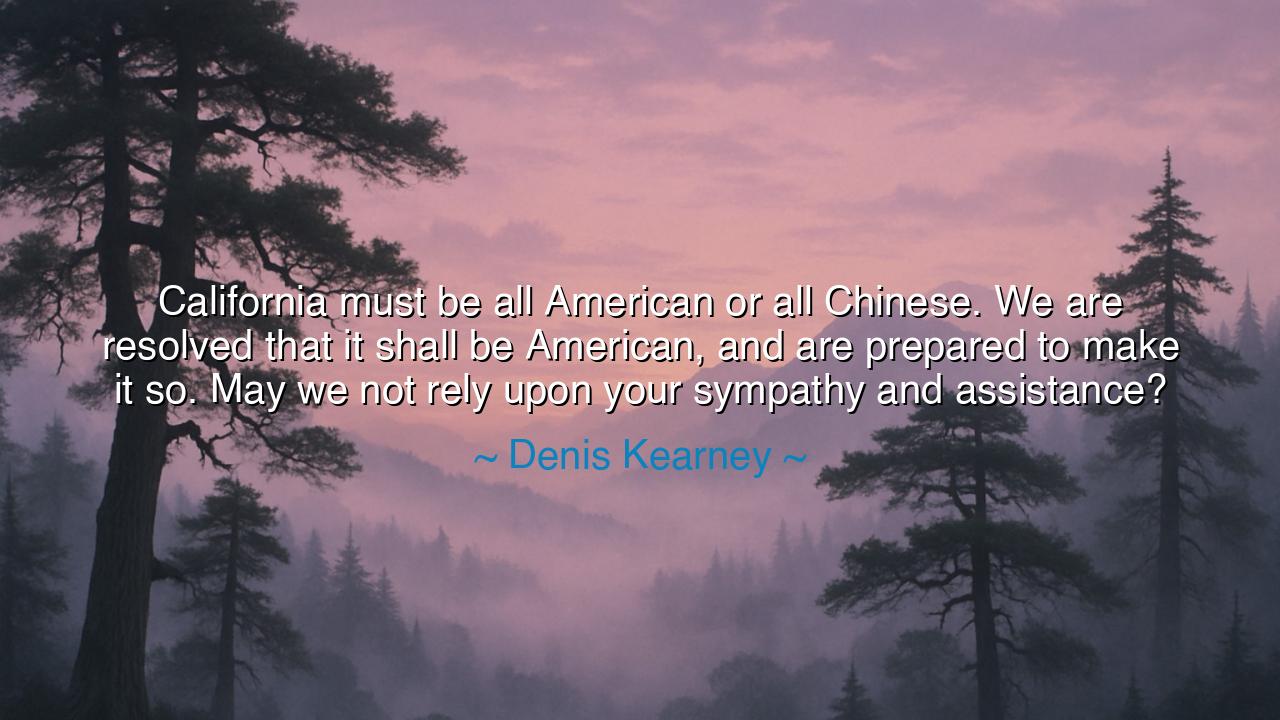
California must be all American or all Chinese. We are resolved
California must be all American or all Chinese. We are resolved that it shall be American, and are prepared to make it so. May we not rely upon your sympathy and assistance?






"California must be all American or all Chinese. We are resolved that it shall be American, and are prepared to make it so. May we not rely upon your sympathy and assistance?" These words, spoken by Denis Kearney, echo the tension and conflict that marked a pivotal time in American history. In this statement, Kearney, a leader of the Workingmen's Party of California, articulates the nativist sentiment that was rife in 19th-century America. The context of this quote lies in the intense racial and economic struggles surrounding the influx of Chinese immigrants into California, particularly during the era of the Transcontinental Railroad and the subsequent economic growth of the region. Kearney's words reflect a deep anxiety over the changing social and economic landscape and a determination to preserve a certain vision of American identity.
The central idea of Kearney’s statement is the belief in the exclusivity of the American identity, which he felt was threatened by the presence of Chinese immigrants. His appeal to others to make California “all American” reveals the intense xenophobia that fueled the growing anti-Chinese sentiment during this period. In his view, the Chinese were seen not only as a labor force that threatened the jobs of American workers but also as a cultural force that stood in opposition to the ideals he believed California should represent. Kearney’s call to sympathy and assistance is a plea for others to join his cause, to support the removal of the perceived threat and to protect what he saw as the American way of life.
To understand the origins of Kearney’s words, we must look at the historical context in which they were spoken. The late 19th century in America was marked by profound change. The railroad system expanded westward, opening the doors to a massive influx of immigrants, many of whom were from China. These workers, largely employed in the construction of the Transcontinental Railroad, were seen by many as a cheap, expendable labor force. As the railroad project progressed and more Chinese immigrants arrived, tensions between native-born Americans and the immigrant population began to escalate. The Chinese Exclusion Act of 1882, which Kearney ardently supported, was a legal manifestation of this growing hostility, and his words reflect the divisiveness that characterized this period in American history.
However, history reveals that the anti-Chinese sentiment was not just the product of economic insecurity; it was also tied to the racial prejudices that were deeply entrenched in American society at the time. Kearney’s rhetoric, with its call for racial purity and his insistence that California be either "all American or all Chinese," illustrates the deep-seated belief that a nation’s identity could be defined by the racial composition of its people. It reflects the notion that immigrants—regardless of their contributions—were seen as foreign intruders whose presence threatened the purity of the national character.
This history, though deeply painful, is essential to understanding the roots of nativism and the ways in which racial tensions continue to shape society. The echoes of Kearney’s words can still be heard in modern debates over immigration, where fear and xenophobia continue to fuel opposition to the movement of people across borders. The demand for an "American" identity—defined in narrow, often exclusionary terms—remains a powerful force in many parts of the world. It is a challenge to our understanding of what it means to be a nation, to be part of a global community, and to recognize the value of diversity in all its forms.
The lesson to be drawn from Kearney’s words is not one of justification, but rather a warning about the dangers of unchecked prejudice and nationalism. While Kearney’s plea for action was rooted in a desire to protect what he believed was the essence of American society, it was also a reflection of the failure to embrace diversity and to understand the interconnectedness of human communities. Kearney’s narrow vision of who was worthy of being called American stands in stark contrast to the ideals of inclusivity and equality that are meant to be the foundations of a just society.
In practical terms, Kearney’s appeal to action reminds us that we must remain vigilant against the forces of xenophobia and division in our own time. We must be ever mindful of the ways in which fear and prejudice can shape political discourse and drive communities apart. Rather than seeing those who are different as threats, we must strive to see them as part of the rich tapestry of humanity. It is through our shared experiences, our shared struggles, and our shared goals that we will build a better future—one that embraces diversity and unity in equal measure.
Thus, the true lesson of Kearney’s words is not to be found in the message he espoused, but in the call to reject the divisiveness that so often arises in times of change. The strength of a nation lies not in its racial purity, but in its ability to include and celebrate the diversity of its people. By moving beyond the narrow confines of exclusion and embracing the richness of global human experience, we can foster a society that is not only stronger, but more compassionate, more just, and more humane.






AAdministratorAdministrator
Welcome, honored guests. Please leave a comment, we will respond soon